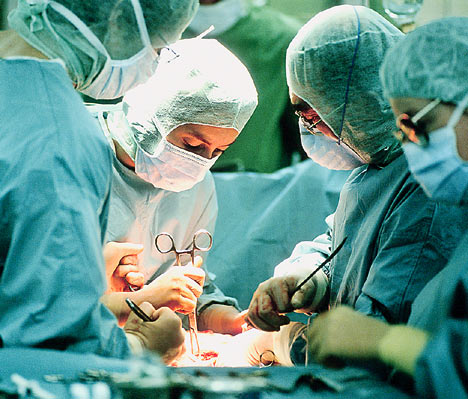Instead of fasting, patients are given carb rich meals such as potatoes and pasta up to six hours before surgery
, and high-energy drinks up to two hours before, reports the Daily Mail.
 |
| Eating Before Operation May Speed Recovery |
Research confirms this approach works -- patients have fewer complications, their recovery time is dramatically speeded up, and hospital stays can be cut in half.
Patients can be home in as little as three or four days, instead of the usual several weeks for abdominal surgery, for instance.
The medical protocol, for more than a century, has been to starve patients up to 12 hours before surgeryAnd if you've had abdominal surgery, you may have to fast for up to a week after the procedure too -- leaving you immobilised for weeks.
Not surprisingly, the frail and elderly patients often suffer rapid weight loss; they are left weak and vulnerable to infection and take longer to recover.
Michael Attard, a bowel cancer patient at St Mark's Hospital, London, one of the first hospitals to use the new approach, has recently benefited from this new recovery programme.
"My surgeon told me I'd need 6 in(ches) of my bowel cut out, because of a cancerous polyp, and then have my colon joined back together. It sounded fairly drastic," says Attard, 78, a retired engineer, from north west London.
"I'd had prostate cancer - diagnosed only two months before which had been a big shock and already it had spread to my bowel, so it was all quite alarming.
"I'd assumed I'd be stuck in a hospital bed for weeks and be totally incapacitated, and that it would take months to get over it."
But the morning after surgery, his wife Jean, 76, was stunned to see Attard sitting up sipping tea and amazed when, a few hours later, he walked up the corridor to the loo.
"Jean was expecting to see me spaced out on morphine and tucked up in bed, only to find me sitting up in the chair looking well. She couldn't believe how quickly I'd got over the surgery. I was equally stunned about how well I felt," recalls Attard.
Enhanced Recovery (ER) has quietly revolutionised pre- and post-operative care for patients.
The approach was pioneered in the late 1990s by Danish surgeon Prof Henrik Kehlet, who thought it illogical to starve patients when they needed their strength for recovery.
